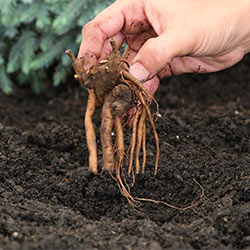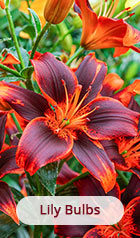About Deer Resistant Plants from Michigan Bulb
Rural and even suburban living can mean a lot of interaction with native wildlife! And while the majority of these interactions prove to be both exciting and memorable, one animal has made itself the nemesis of gardeners everywhere: the deer. You may see deer as stately creatures, road hazards, cute cartoon characters, or jerky ingredients. However, you'll probably agree that these animals make rude dinner guests in your garden. When planning your next garden addition, consider adding deer-resistant plants. Though there are no flowers deer won't eat if they are hungry enough, these plant selections are a great deer deterrent. With deer-resistant plants, you can worry less about the deer and focus on what to plant next.
What are Deer Resistant Plants?
Deer resistant plants are specially designed flowers and bulbs made to discourage deer from devouring them. Though there is a wide array of these kinds of plants to choose from, you should keep in mind that no plant is completely safe from your four-legged friends. If a deer is hungry enough, they'll still indulge in a mouthful of thorny deer resistant flowers.
Choosing Deer Resistant Plants
Deer typically enjoy juicier plants with soft corms or roots and tender greens. This is why deer resistant plants often boast woodier stems and thicker skin. When finding the best plant for your situation, consider the following:
Sedum - Most sedum feature a hard double-featured exterior, allowing the plants to retain water and serve as a protective cover, making these great deer-resistant plants to have in the garden
Grasses and Lilac - Both grass and lilacs are thin, making them the ideal deer resistant plants and flowers, as they just don't provide the tenderness that most animals want.
Coneflowers, Rudbeckia, and Asters - Woodier, less succulent stalks like coneflowers are a turnoff for deer perusing for greens.
Gladiolus - Gladiolus plants are some of the tougher deer-resistant plants, and less likely to attract snackers.
Shade plants - Many shade plants prefer acidic soil and produce an acidic taste. Deer tend to reject these (although some are also poisonous to pets, so check your plants before allowing your pets to roam your shade garden).
What plants keep deer away?
Sick of deer using your garden as a buffet? The easiest way to keep deer from grazing your plants is to simply choose plants that they find less appealing. When a majority of your garden are deer-resistant plants, deer are less likely to chew on your juicy saplings or tasty bulbs.
Four-legged foragers tend to look for soft, green foliage, sweet shoots, and juicy leaves, so your best bet is to choose rough, dry, or harshly flavored plants. Plants with rough exteriors or hard pieces are more difficult to chew, and don't make for a savory supper. Deer tend to avoid grasses, lilacs, rudbeckia, coneflower and roses, because their rough textures make them harder to chew or digest. Gladiolus and daffodils feature harder bulbs which makes them, as deer resistant bulbs, less appealing than soft bulbs to deer and squirrels alike.
When determining which plants deer won't eat, consider selections with a strong taste or scent that deer won't appreciate. Shade plants prefer acidic soil, so they develop an acidic taste: deer prefer sweeter greens. Highly fragrant plants can also be a turnoff for deer: try herbs, peonies, or German iris. Those plants just smell too strong for their sensitive noses.
Are there some deer-resistant plants that are more potent than others?
Some plants are definitely more deer resistant than others! Deer love to eat from plants that offer soft, juicy foliage and tender flowers: geraniums, tulips, daisies, impatients, and all sorts of tender shrubs are highly desirable to four-legged friends. If you love these plants, don't get discouraged: deer repellant and physical barriers like fencing and netting can help to keep deer from ruining your favorite perennials and shrubs
Plants with less juicy shoots and flowers are much less likely to attract deer, as are plants with strong smells and tastes. In our selection of deer-resistant plants, you'll see such beloved beauties as bearded irises, succulents, peonies, butterfly bushes, coneflowers, daffodils, lily-of-the-valley, calla lily, crocus, allium, dogwood, mums, snowdrop, aconite, and much more. There are deer-resistant plants available for every season. And, planting deer resistant plants near your favorite tender varieties will deter deer from making a restaurant of your landscape.
Are there any extremely toxic deer resistant plants?
Deer are intelligent and highly-adapted critters: they won't eat plants that are bad for them. Deer tend to avoid highly toxic plants. However, you'll want to ensure that these plants stay out of reach of children or pets: the same plants that are toxic to deer are toxic to other mammals, too. Lily-of-the-valley is a classically beautiful, but poisonous plant, as are lungwort and poppies. Nightshade plants like foxglove are also toxic and deer resistant. If you choose to plant these deer-resistant and lovely flowers, make sure to keep them in a part of your garden that won't be accessible to pets: deer know what to avoid, some of our domesticated furry friends may not!
Are there any plants deer will not eat?
Unfortunately, there are almost no plants that are entirely safe from deer. A hungry deer will fight through most plants' defenses if pickings are truly sparse, especially in winter. However, there are several types of avoidable bulbs and plants deer won't eat.
Thorny, woody, or hard plants
Deer prefer soft corms and juicy leaves; the easier access, the better. Anything thorny, rough, or tough will make a difficult meal for deer: after all, who wants to head face first into a rose bush? Roses, cacti and succulents, and evergreens like boxwoods are great deer resistant plants. Plants like coneflower, lilac, or butterfly bush are woodier and therefore less attractive to grazing deer. However, woody shrubs with soft leaves and flowers, such as hydrangeas, are favorites for deer: they will ignore the woody part and chew the soft edges.
Poisonous plants
Deer tend to know which plants are toxic, so they'll avoid foxgloves, daffodils, helleborus, or bleeding hearts. These are just a few of the many different poisonous plants deer won't eat.
Hardened plants or hard bulbs
Which flowering bulbs are deer resistant? Small, hard bulbs are not worth the time of most deer. Gladiolus and crocus fall into this category, along with snowdrops and grape hyacinths. These plants have small bulbs without a lot of lush foliage--deer won't waste their time.
Plants with strong scents or tastes
Again, deer love sweet, soft green things. Shade plants tend to have a high acid content that deer dislike. Plants with strong smells, such as peonies or iris, are also uninviting for deer. Try planting your favorite herbs among your ornamental flowers: sage, lilac, and rosemary are quite beautiful, and their scents help ward off deer.






















